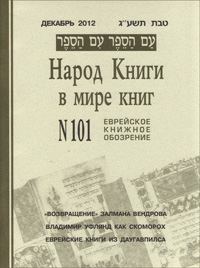The People of the Book in the World of Books is a Russian bimonthly publication for serious readers with Jewish interests. Our English website includes only the summaries of the published articles. To access the complete text of them, please visit the Russian version of this website.

|
||
|
This issue of the magazine includes:
• Names: Zalmen Vendrof (1877–1971)
Born in Slutsk, Belorussia, Zalmen Vendrof (alternately, Wendroff) traveled the world in the early years of the twentieth century, trying different jobs in England and America. In 1908, he returned to the Russian Empire. Until the Bolshevik Revolution, he lived in Warsaw, where he wrote for local newspapers and gained a reputation as one of the leading Yiddish writers and journalists of the time. Beginning in the 1920s, he worked as the Moscow correspondent of Forverts, the largest US Yiddish daily. His situation was unique: he was probably the only Soviet citizen who officially worked for an anti-Soviet newspaper. After 1930, this collaboration was no longer possible, and Vendrof began seeking out a place in Soviet Yiddish literary circles—not an easy task for a person with his background. In 1950, during the post-war anti-Semitic campaign in the Soviet Union, Vendrof was arrested; he was released only in 1956. His last Yiddish book was published in Moscow in 1967. This biographical sketch of Zalmen Vendrof includes a recently discovered letter that he wrote to the Soviet Writers Union in 1938, at the peak of Stalin’s Great Terror.
• Synopses: Vladimir Ufliand’s Collection of Texts and Drawings
This essay about the poetry of Vladimir Ufliand (1937–2007), Russian avant-garde poet, artist, and playwright, was inspired by the most complete collection of his “rhymed texts” (accompanied by his own drawings), which has been posthumously published in St. Petersburg.
• Looking Through Russian Literary Magazines: Novels and Articles of Jewish Interest
• Publishers and Publishing Projects: Jewish Books from Daugavpils
This section features a complete bibliography of Russian-language books on Jewish history published during the post-Soviet period in the Latvian city of Daugavpils.
• Jewish Calendar of Significant Dates: January–February 2013
• Bibliography: 50 New Books |


